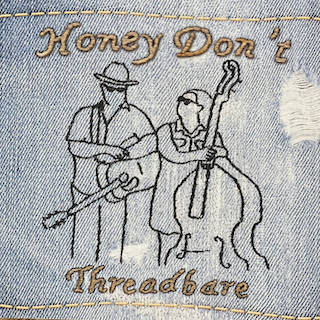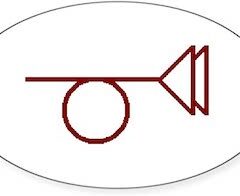
Honey Don’t (from left: CJ Neary, Bill Powers, Shelley Gray, Don Hawkins, Benji Nagel): Speaking to a larger moment
By David McGee
 THREADBARE
THREADBARE
Honey Don’t
Bandcamp
Back in 2014 the husband-and-wife roots duo known as Honey Don’t issued one of the finest long players of the year in Heart Like a Wheel, a splendid followup to the group’s impressive 2009 self-titled debut. At that time the duo—Bill Powers (songwriter, guitarist, vocalist) and Shelley Gray (bass, vocals)—was referred to in these pages as “the Pride of Paonia, Colorado,” an artist-centric burgh they called home (as did another long-time Deep Roots favorite, the outstanding singer-songwriter Gabrielle Louise) for many years while raising a family. The couple were quite active in the Paonia arts scene, Powers hosting a roots music show on NPR station KVNF in addition to teaming with his wife in an old-timey band they dubbed Sweet Sunny South (which gets a fleeting reference in the high stepping, bluegrassy album opener, “Eight More Miles”); another group expressly devoted to entertaining children and memorably called Duck Duck Grey Duck; leading a straight-ahead rock ‘n’ roll outfit known as the Silvertone Devils; and of course, Honey Don’t. Come 2014, though, they up and moved to Bend, Oregon (“Our family thought we were nuts,” Powers told Source Weekly reporter Isaac Biehl). Eight years later, here comes Honey Don’t anew, with both principals looking more rustic these days and sounding better than ever on their third album, Threadbare.
No matter their home being in Oregon for night on to eight years now; some of the songs on Threadbare were mostly in finished form when Honey Don’t released Heart Like a Wheel. If you knew the band only as a Colorado-based group, you would say of course, owing to the mountain feel and flavor and some outright references to favorite landmarks (“Big Water Ahead,” “Denver Ramble,” “High Country News Girl,” “Yampa,” “Red Mountain Pass,” et al.), all crying “Hey, Colorado!” As Powers told Isaac Biehl, “A lot of it is a culmination, and sort of a farewell to Colorado. I wasn’t doing that intentionally but there’s so much reference to Colorado on there.”

Bill Powers and Shelley Gray
Indeed, and that’s mighty fine. Recording with producer/engineer Keith Banning in Sisters, Oregon, Powers and Gray are more than ably supported by an accomplished trio of central Oregon musicians they’ve been playing with almost since landing in Bend, including Benji Nagel on dobro, Don Hawkins on snare drums and teenage whiz CJ Neary on fiddle. Powers’s husky voice is ever more expressive and captivating in its truth telling command, and Ms. Gray’s harmonies—silky and heart tuggingly plaintive alike—continue to be wondrous, along with her note-perfect, understated bass support.
The music—betraying roots in bluegrass, traditional country, folk and blues, with ample atmospherics courtesy dobro and fiddle amplifying Powers’s deeply rendered love of the land he called home for so long—tells of an environment from which Powers felt inseparable, along with cautions against disfiguring its natural beauty. Arguably, what Powers stands for is most compellingly expressed in “Yampa (Ain’t No Dam on the Yampa),” his ode to the Yampa River, described in Wikipedia as “one of the last free-flowing rivers in the western United States, with only a few small dams and diversions.” It begins with his lightly strummed acoustic guitar and a splash of dobro framing his soft but firm assertion, “Ain’t no dam up on the Yampa/Lord, I pray there’ll never be/Don’t try to hold her, just let her go her own way/Let that wild river run free.” As the fiddle and snare drums enter discreetly establishing a soft shuffle rhythm, Powers tells of visiting the Yampa with a friend, inspiring him to vivid metaphorical flights conjuring his night in the natural world; nights that resonate in memory: “Seen the stars at night like diamonds/seen them falling down like rain/the way the moonlight plays the shadows on the stone/the way the river sings her bold refrain/the song is flowing through the canyon/the song is laughing in my heart/she lets her good love shine/and she plays rough some time/but Lord knows she’s done her part…”

Honey Don’t performs the title track from Threadbare at McMenamins Old St. Francis School, January 26, 2022. From left: Bill Powers (songwriter, guitar, vocal); Shelley Gray (bass); CJ Neary (fiddle); Don Hawkins (snare drums); Garrett Miller (banjo).
There’s a sprightly talking blues in the frisky “Denver Ramble,” with Powers, Nagel and Neary all taking lively solo runs between the celebratory verses when Gray joins in the frolics. The pull of the water animates both the fiddle- and dobro-fired romp that is “Big Water Ahead” and the tender instrumental “Daybreak on the Muddy,” a moment notable for the soulful outpourings each musician offers in seamless harmony when each one’s turn comes around in closing the album on a thoughtful, heartfelt note. There’s a hint of western swing and the duo’s Sweet Sunny South incarnation in the humorous, freewheeling ode to a fetching female in “Five Foot Four from Fort Worth,” especially with Nealy’s sprightly fiddling complementing the narrative. It’s finger-poppin’ time on the album’s witty love song, “Anything For You,” a lively workout in which the narrator asserts his enduring affection for his beloved while admitting how own failings and advising to take the long view: “let it go, let it grow, let it grow wings and fly.” Most affecting on the love front, “For the Roses” might, to long-time Honey Don’t fans, recall a bit of their Duck Duck Grey Duck days in its sweet, nursery rhyme sentiments and a soundscape augmented by the rich tones of Leah Beshore’s viola, as Powers advises, “It’s a story song to sing/so let’s be glad it chose us”—an interesting take on the songwriting process—“one more before we say goodnight/one more before we turn out the light/one more just to set things right/one more…for the roses…”
Threadbare is not altogether different from the southwestern landscape another former Coloradoan, Michael Martin Murphey, explores in his powerful 2022 album, Road Beyond the View. Both reveal an inextricable connection—physical, spiritual–to the land in evocative acoustic soundscapes and especially in the songwriters’ poetic evocations of the natural world they move through. And Threadbare shares one other aspect in common with Murph’s album: in thrall to the mystical bond with nature shared by these two songwriters—two of the finest in American music—a listener is beckoned back to the songs; again and again, beckoned back. The more you hear, the more you hear with new ears. Once more you listen; once more, to set things right. Until it grows wings and flies. Deeply invested in a moment, Threadbare speaks to a larger moment, to time immemorial.


